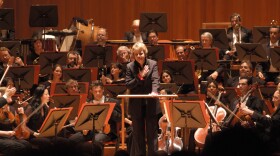
Marin Alsop
In 2007, Marin Alsop became music director of the Baltimore Symphony, making her the first woman to head a major American orchestra. She was named a 2005 MacArthur Fellow, the first conductor ever to receive the award. Between performances, she appears as an occasional guest on Weekend Edition Saturday and as a commentator for NPR.org's Marin Alsop on Music column.
-
The groundbreaking conductor — the first woman to lead a major American Orchestra — reflects on 14 years as music director of the Baltimore Symphony.
-
For nearly 200 years, Beethoven's epic Ninth Symphony, with its powerful "Ode to Joy," has inspired millions. Now conductor Marin Alsop takes it on a world tour.
-
Conductor Marin Alsop muses on the power of ballet and her memories of watching choreographer George Balanchine bring the music of Tchaikovsky to life with the New York City Ballet.
-
After 25 years directing the contemporary music festival in California, Marin Alsop bids farewell with Lola Montez Does the Spider Dance, a new piece composed for her by John Adams.
-
After he was publicly denounced, Shostakovich rebounded with the compelling and calculated Symphony No. 5. The music supplied a soundtrack for the Soviet people and satisfied the apparatchiks.
-
Inspired by Shakespeare, Mendelssohn captures all the magic and frivolity in the music he wrote for the Bard's otherworldy play.
-
An action thriller of a symphony, Mahler's First is piled high with ambition, self-reflection and fear. Conductor Marin Alsop shares her approach to Mahler's multilayered music.
-
For conductor Marin Alsop, discovering Benjamin Britten through his monumental War Requiem has been both easy and complex — a perfect summation of the man himself.
-
For conductor Marin Alsop, Bernstein's idiosyncratic Second Symphony — inspired by W.H. Auden's poem The Age of Anxiety — is a musical quest to answer life's big questions with time out to throw a hip-swinging party.
-
The man who wrote "The Charleston" also had orchestral music played at Carnegie Hall. Baltimore Symphony conductor Marin Alsop retraces her detective work in uncovering lost symphonic works by jazz piano pioneer James P. Johnson.











